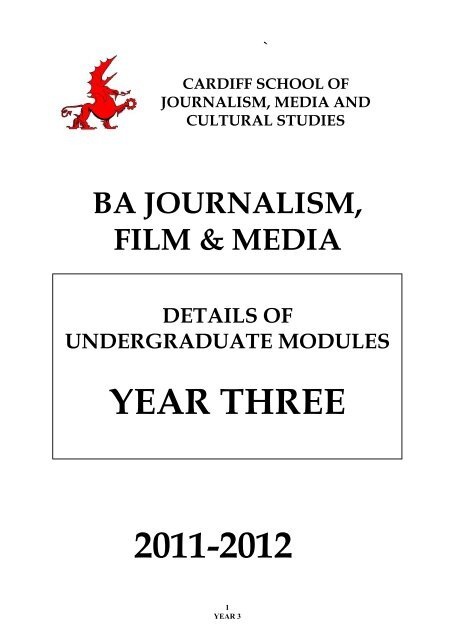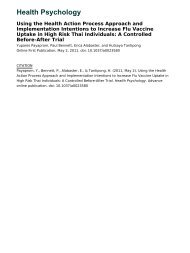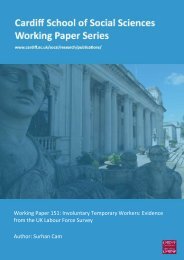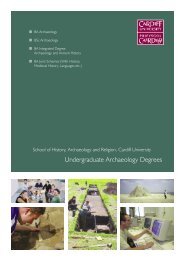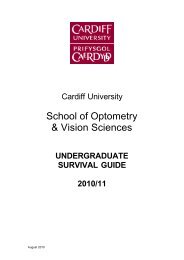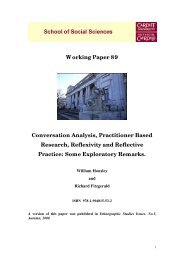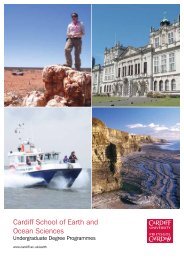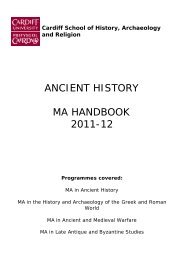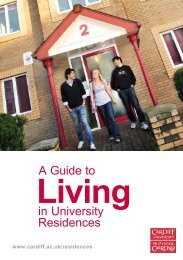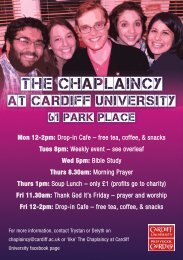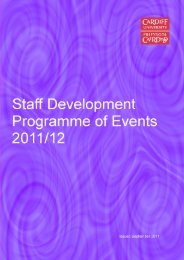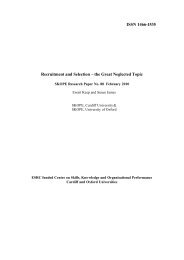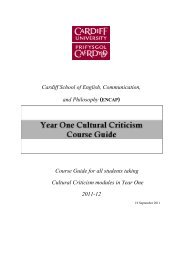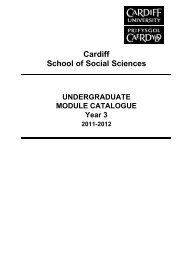2011-2012 YEAR THREE - Cardiff University
2011-2012 YEAR THREE - Cardiff University
2011-2012 YEAR THREE - Cardiff University
You also want an ePaper? Increase the reach of your titles
YUMPU automatically turns print PDFs into web optimized ePapers that Google loves.
`<br />
CARDIFF SCHOOL OF<br />
JOURNALISM, MEDIA AND<br />
CULTURAL STUDIES<br />
BA JOURNALISM,<br />
FILM & MEDIA<br />
DETAILS OF<br />
UNDERGRADUATE MODULES<br />
<strong>YEAR</strong> <strong>THREE</strong><br />
<strong>2011</strong>-<strong>2012</strong><br />
1<br />
<strong>YEAR</strong> 3
<strong>YEAR</strong> 3 STUDENTS<br />
IMPORTANT INFORMATION REGARDING<br />
MODULE CHOICES FOR <strong>2011</strong>/<strong>2012</strong><br />
Please note the following:<br />
Before Pre-Enrolling ALL students must see their Personal Tutors to<br />
discuss module choices for their next year of academic study.<br />
A list confirming Personal Tutors is available for all to see on Blackboard<br />
under the JOMEC Year Two Module.<br />
Personal Tutors will be available for discussion on Friday 8 th April <strong>2011</strong>,<br />
Monday 11 th April <strong>2011</strong> and Tuesday 12 th April <strong>2011</strong> and will have<br />
appointments on their door for you to sign up to.<br />
Pre-Enrolment<br />
The school will confirm to you via email by 9am on Thursday<br />
14 th April <strong>2011</strong> the modules you are permitted to take.<br />
You will then be able to pre-enrol online via your online Sims<br />
Account.<br />
You will not be allowed to pre-enrol unless you<br />
have seen your Personal Tutor.<br />
2<br />
<strong>YEAR</strong> 3
DISCLAIMER<br />
All students are notified that the modules advertised or referred to in this<br />
catalogue are liable to be changed or withdrawn both before and after<br />
selection for any reasons including those set out below. <strong>Cardiff</strong> <strong>University</strong><br />
accepts no responsibility for any such changes or withdrawals of modules.<br />
Students select modules on this understanding.<br />
Reasons that may cause the change or withdrawal of modules include:<br />
• Changes in lecturing staff<br />
• Insufficient students enrolled on a module.<br />
SEMESTER DATES <strong>2011</strong> - <strong>2012</strong><br />
Provisional Semester Dates for Undergraduate Modular Programmes<br />
Please check for final dates on the <strong>Cardiff</strong> <strong>University</strong> Website during the<br />
Summer Recess.<br />
AUTUMN SEMESTER<br />
Monday 03 October <strong>2011</strong> to Sunday 29 January <strong>2012</strong><br />
Christmas Recess: Saturday 17 December <strong>2011</strong> to Sunday 08 January <strong>2012</strong><br />
SPRING SEMESTER<br />
Monday 30 January <strong>2012</strong> to Friday 15 June <strong>2012</strong><br />
Easter Recess: Saturday 31 March <strong>2012</strong> to Sunday 22 April <strong>2012</strong><br />
3<br />
<strong>YEAR</strong> 3
1. Calculating Your Degree<br />
The second and third year of your degree is weighted 40/60. Your overall<br />
degree is calculated by the average mark calculated from modules studied<br />
over this final two year period. You need to have gained a total of 360 credits<br />
over the three year period spent studying the degree.<br />
The degree classes and the average mark needed to obtain them are listed<br />
below:<br />
Combined Weighted<br />
Average<br />
70% +<br />
60%
plagiarise in their written work whether assessed or nonassessed.<br />
If they do so, their mark will be affected and, in the<br />
case of assessed work, they will also have committed an unfair<br />
examination practice.<br />
2. Students may, of course, make use of the ideas of others.<br />
However, this must be acknowledged according to the<br />
following conventions.<br />
3. Each use of the ideas or words of another must be individually<br />
acknowledged in a footnote. In addition each work consulted<br />
must be listed in the bibliography. The mere presence of a work<br />
in the bibliography does not override the need for<br />
acknowledging each individual use of that work in a footnote<br />
and, though necessary, is by itself insufficient.<br />
4. Any use of the exact words of another must be acknowledged<br />
by enclosing them in quotation marks and by stating their<br />
source in a footnote, using the Harvard referencing system.<br />
3 Method of Teaching and Assessment<br />
3.1 LECTURES AND SEMINARS:<br />
Attendance at lectures and seminars is COMPULSORY. Poor<br />
attendance at lectures and seminars will be deemed inadequate<br />
performance and will be reported as such to the Examining<br />
Board. Persistent non-attendance at lectures and seminars<br />
may result in a Student being issued with a notice of<br />
exclusion. (The Examining Board concerned shall have<br />
discretion to decide whether, on the basis of evidence received,<br />
a student has been absent with good cause.)<br />
3.2 GROUP WORK:<br />
Some modules are assessed by group work. Students should be<br />
aware that this may mean that no re-sit option is available due<br />
to the nature of the assessment. Please check with the relevant<br />
module co-ordinator for further details.<br />
3.3 DEADLINES:<br />
Students will be informed in writing of dates for written work<br />
submission for each module. Work submitted after the<br />
specified date without a reasonable documented excuse will<br />
result in a maximum mark of Pass only (40%).<br />
3.4 WORD PROCESSING:<br />
All pieces of submitted work must be word-processed and<br />
carried out according to the Document Guidelines issued to all<br />
Year 1 students upon entry to the School. (A copy may be<br />
obtained from the Office).<br />
5<br />
<strong>YEAR</strong> 3
3.5 NOTIFICATION OF RESULTS:<br />
Module results will be published at the end of the semester in<br />
which that module has been assessed.<br />
3.6 SECOND MARKING:<br />
A sample of all student work on each module is second-marked.<br />
This sample consists of all Firsts, all Fails and a sample of all<br />
other mark bands; it also includes problem cases, e.g. suspected<br />
plagiarism or marks contested by the student. A reduced<br />
second-marked sample will then be sent to the External<br />
Examiner for consideration and comment.<br />
Please note: All Marks Are Provisional Until After External<br />
Examiners’ Moderation & Final Exam Boards at the end of the<br />
Spring Semester.<br />
3.7 ABSENCE FROM ASSESSMENT:<br />
The Examining Board concerned shall have discretion to decide<br />
whether, on the basis of the evidence received, a candidate has<br />
been absent with good cause.<br />
3.8 EXTENUATING CIRCUMSTANCES:<br />
A Student who is absent with good cause, or who is unable to<br />
submit written work at the specified time who produces<br />
documentation of illness, accident, close bereavement or on<br />
closely related compassionate grounds shall be deemed to have<br />
Special Circumstances.<br />
Please note: The Undergraduate Examination Board will not<br />
consider Special Circumstances retrospectively [i.e. after an<br />
Examination Board], or at Appeal stage.<br />
3.9 PROGRESSION:<br />
The Examining Board shall meet at the end of each session in<br />
order to consider the performance of a Student in each module<br />
completed during the academic year.<br />
The pass mark for each module is 40%.<br />
Core Modules cover knowledge considered fundamental for the<br />
degree and as such must be passed before any student can<br />
progress to Year Three.<br />
Students who fail to obtain 120 credits in Year 1 shall not be<br />
eligible to proceed to their next year of study, except at the<br />
discretion of the Examining Board.<br />
6<br />
<strong>YEAR</strong> 3
A Student who has failed to obtain 120 credits in Year 2 shall be<br />
permitted to progress to Year 3 providing he or she has not<br />
failed more than 20 credits and at the discretion of the<br />
Examining Board.<br />
At the discretion of the Examining Board, a Student who has<br />
failed one or more modules may be given the opportunity to<br />
retrieve these credits during a re-sit period.<br />
Chair of Undergraduate Board of Studies<br />
Chair of Undergraduate Examining Board<br />
Executive Officer:<br />
Dr John Jewell<br />
Jewellj@cf.ac.uk<br />
Dr Matt Hills<br />
HillsM2@cf.ac.uk<br />
Ms Rebecca Harris<br />
HarrisRL@cf.ac.uk<br />
7<br />
<strong>YEAR</strong> 3
THIRD <strong>YEAR</strong> MODULES<br />
Students are required to take three modules from each semester worth a total<br />
of 60 credits per semester, 120 credits for in total for the year. Each module in<br />
Journalism, Film and Media Year 3 counts for 20 credits, with the exception of<br />
the Dissertation module which counts for 40 credits and runs through both<br />
semesters. Completing these will fulfil your degree requirements.<br />
PLEASE NOTE THE FOLLOWING<br />
1. You cannot repeat modules that you have already taken in your second<br />
year.<br />
2. We will endeavour to allocate you to at least one practice-based module<br />
if it is part of your selection.<br />
3. If you select the dissertation, which is 40 credits, you take the module in<br />
both semesters 1 & 2.<br />
AUTUMN SEMESTER MODULES<br />
CODE MODULE TITLE TUTOR<br />
MC3103 Dissertation<br />
Dr Kerry Moore<br />
[co-ordinator]<br />
MC3513 Media Law Prof. Duncan Bloy<br />
MC3457<br />
Advertising and the Consumer<br />
Society<br />
Dr John Jewell<br />
MC3564 About Photographs Dr Daniel Meadows<br />
MC3566 Writing with Light Dr Sara Jones<br />
MC3593 Media, Racism, Conflict Dr Kerry Moore<br />
MC3596<br />
MC3599<br />
Spin-Un-Spun: Public Relations and<br />
the News Media<br />
Journalism, New Media and the<br />
Public<br />
Dr Andy Williams<br />
Inaki Garcia-Blanco<br />
8<br />
<strong>YEAR</strong> 3
MC3103 Dissertation Autumn & Spring<br />
40 Credits<br />
TUTOR: Dr Kerry Moore – Co-ordinating Tutor<br />
Conditions of Enrolment<br />
Any student wishing to enrol for this module should have attained, or have<br />
the potential to attain, an overall average of above 60% for work undertaken<br />
in their second year of study.<br />
The Dissertation<br />
The dissertation involves two semesters of independent research on a<br />
problem or question identified by the student. A supervisor will be<br />
appointed to advise and oversee the different stages of the research and<br />
students will be offered a short series of seminars on Approaches and<br />
Methods for Media Research. The research may be primarily theoretical in<br />
nature, for example, surveying and addressing the relevant literature /<br />
research in a particular field. Alternatively, the research may be based upon<br />
empirical work and involve the collection of data using social scientific<br />
methods and techniques such as surveys, interviews, participant and nonparticipant<br />
observation. In either case, a specific thesis or argument is<br />
developed throughout the dissertation and substantiated with appropriate<br />
evidence. Ideally, a combination of empirical and theoretical research will be<br />
undertaken.<br />
Dissertations completed by previous students have covered such broad areas<br />
as Islam and Western media, violence and the media and gender issues. In<br />
each case, a highly specific question is tackled and contextualised within the<br />
general area. The more specific the question the better.<br />
Permission to take this module will depend upon your grades and be subject to<br />
approval of your dissertation proposal. You will be assigned an individual<br />
Dissertation supervisor.<br />
Methods of Assessment:<br />
Assessment will be based on production of a 10,000 - 12,000 word<br />
dissertation, subject to approval of a thesis proposal, the whole worth the full<br />
100% of the marks.<br />
Methods of Teaching:<br />
Lectures, seminars, independent and guided study.<br />
9<br />
<strong>YEAR</strong> 3
MC3213 Media Law (capped at 50) Autumn<br />
TUTOR: Professor Duncan Bloy 20 Credits<br />
Aims of the Module<br />
The media law course aims to evaluate the legal context within which the UK<br />
media operates. From a media perspective the overriding consideration is the<br />
exercise of its Article 10 (European Convention of Human Rights) right to<br />
freedom of expression. This module will show how the media and the law<br />
can co-exist happily but also what happens when tensions arise. It is practical<br />
in approach and will consider major issues such as defamation, breach of<br />
privacy and confidentiality, reporting restrictions, contempt of court,<br />
protection of journalistic sources and material, media regulation, copyright<br />
and image rights issues. This module will be helpful to those who are<br />
intending to make a career in the media.<br />
Learning Outcomes<br />
At the culmination of your studies you will understand the ways in which<br />
legal intervention and self regulation affect the media. You will also be aware<br />
of the restrictions imposed by law upon print journalists and broadcasters..<br />
Method of Teaching<br />
This will depend on the numbers but irrespective of whether it is a lecture,<br />
seminar or workshop environment it will be as interactive and participative<br />
as possible.<br />
Method of Assessment<br />
One piece of coursework of approximately 1750 words counting 40 %<br />
towards the final total<br />
A second piece of coursework of approximately 2250 words counting<br />
60% towards the final mark.<br />
All students will attempt the first piece of coursework and receive feedback<br />
prior to embarking upon the second coursework. For this students will have a<br />
choice of topics or have the option to ‗negotiate‘ a question with the tutor.<br />
Syllabus Content<br />
1. Freedom of Expression<br />
2. Defamation Law<br />
3. Reporting the Courts<br />
4. Contempt of Court<br />
5. Protection of Sources<br />
6. Breach of Privacy and Confidentiality<br />
10<br />
<strong>YEAR</strong> 3
7. Media Regulation<br />
8. Copyright<br />
Suggested Reading<br />
1. Bloy D: Media Law Sage Publications London 2007<br />
2. Hadwin and Bloy: Law and the Media: Sweet & Maxwell London 2007<br />
3. Greenwood, Welsh & Banks: Essential Law for Journalists Oxford<br />
<strong>University</strong> Press 2009. (Latest Edition ).<br />
Other reading material will be recommended at the commencement of the<br />
course.<br />
IN CASE YOU ARE WORRIED: NO PREVIOUS LEGAL KNOWLEDGE IS<br />
NEEDED TO STUDY THIS OPTION!<br />
11<br />
<strong>YEAR</strong> 3
MC3457 Advertising and the Consumer Society (capped at 50)<br />
Autumn<br />
TUTOR: Dr John Jewell 20 Credits<br />
Aims of the Module:<br />
The module intends to furnish the students with the ability to study<br />
advertisements semiotically and to make them aware of the processes<br />
involved in the construction of advertisements. The course will examine<br />
representations of race, gender and stereotype in both print and broadcasting<br />
media. Crucially, the course seeks to establish the advertising industry within<br />
global, economic, cultural and political frameworks.<br />
Learning Outcomes:<br />
It is intended that by the end of the programme students will be able to relate<br />
advertisements and the advertising industry to the wider cultural framework.<br />
Students will be able be able to gauge the impact of the marketing strategies<br />
of multinational companies upon the global market.<br />
Methods of Teaching:<br />
1. Weekly lecture and occasional screening.<br />
2. Weekly seminars in which students will be required to make group<br />
presentations.<br />
3. Guided independent study.<br />
Methods of Assessment:<br />
Written Exam Contribution 0%<br />
Other Percentage Contribution 100%<br />
To include:<br />
1. Seminar Presentation 10%<br />
2. Essay of 2,500 words 50%<br />
3. Research project of 2,500 words 40%.<br />
Indicative Reading List:<br />
Berger, A (2004) Ads, Fads and Consumer Culture. Lanham, Md.: Rowman &<br />
Littlefield.<br />
Cohen Sande and Rutsky R. L. (2005) Consumption in an age of Information.<br />
Oxford: Berg.<br />
Dyer, G (1996) Advertising as Communication. London: Methuen.<br />
Jones, John Phillip (2000) International Advertising. Thousand Oaks, Calif.:<br />
Sage.<br />
Kellner, D (2003) Media Spectacle. London; New York: Routledge.<br />
Klein, N (2000) No Logo. London: HarperCollins.<br />
Lawson, N (2009) All Consuming. London: Viking.<br />
Lubbers, E (ed) (2002) Battling Big Business: Countering Greenwash, Front<br />
Groups and Other Forms of Corporate Deceptions. Totnes: Green<br />
12<br />
<strong>YEAR</strong> 3
Miller, G (2009) Spent: Sex, Evolution and the Secrets of Consumerism. London:<br />
Heinemann.<br />
Monbiot, G (2000) Captive State. London: Pan.<br />
Sassetelli, R (2007) Consumer Culture: History, Theory and Politics. London:<br />
Sage.<br />
Spurgoen, C (2008) Advertising and New Media. New York: Routledge.<br />
Turrow, J and Matthew P. McAllister (2009) The Advertising and Consumer<br />
Culture Reader. New York: Routledge<br />
13<br />
<strong>YEAR</strong> 3
MC3564 About Photographs (capped at 20) Autumn<br />
TUTOR: Dr. Daniel Meadows<br />
20 Credits<br />
Aims of the Module<br />
This is a practical module. It requires you to be creative. You will learn how<br />
to tell the kind of story which emerges only when you uncover what a<br />
photograph means to the people depicted in it. You will do this by seeking<br />
out and working with the private picture archive of someone from outside<br />
the university community, someone of your own choosing from <strong>Cardiff</strong>,<br />
someone who, prior to starting this module, was a stranger to you. You will<br />
learn to listen and make connections. Your findings will be astonishing for<br />
their elegance and humanity. You will present them using multimedia tools<br />
and deliver the results as a "Digital Story" (a kind of mini-movie) on DVD.<br />
.<br />
Learning Outcomes<br />
You will acquire knowledge and understanding of the enormous<br />
potential for storytelling that is tied up in picture archives, particularly<br />
personal archives.<br />
You will learn some skills in the critical appreciation of photographs<br />
and of oral history.<br />
You will learn how to think "outside the box" of traditional media<br />
practice; to open yourself to the notion that the future of journalistic<br />
practice is likely to involve the "facilitation" of — rather than merely<br />
the "telling" of — other people's stories.<br />
You will acquire the ability to script, edit and produce a story using<br />
multimedia technology and also develop skills of interviewing, voiceover<br />
recording, audio and video editing .<br />
Methods of Teaching:<br />
In the lectures you will be shown many examples of how photographs have<br />
been used as the source material for storytelling. Relevant production tools<br />
will also be discussed and demonstrated. Each week you will attend one<br />
lecture and one practical workshop. The module is capped at 24 students and<br />
workshop numbers are restricted to 12 in order to make the most of<br />
dedicated multimedia equipment. Away from the classroom you are<br />
expected to research stories, conduct interviews, gather multimedia assets,<br />
prepare drafts of scripts, work on building your output DVD and keep a<br />
reflective log of your progress.<br />
Method of assessment:<br />
60% of the mark will be awarded for the "Digital Story".<br />
40% of the total mark will be awarded for the production of a reflective log.<br />
Syllabus Content:<br />
The media form. Inspirations.<br />
14<br />
<strong>YEAR</strong> 3
Case studies from the documentary tradition.<br />
Case study: Digital Storytelling BBC Capture Wales.<br />
Making judgements about photographs. Preparing photographs in the<br />
computer.<br />
Non-linear video editing, making a DVD.<br />
Reading and Viewing:<br />
Agee, J. and Evans, W. 1941. Let Us Now Praise Famous Men. Boston:<br />
Houghton Mifflin. (Bute Library HN79.A5.A4)<br />
Auster, P. 2001. True Tales of American Life. London: Faber and Faber.<br />
(Arts & Social Studies Library E169.12.T7)<br />
Gillmor, D. 2004. We the Media. Sebastopol (CA): O'Reilly. (Bute<br />
Library PN4784.O6.G4)<br />
Illich, I. 1975. Tools for Conviviality. London: Fontana. (Bute Library<br />
HD6955.I5 and other libraries)<br />
Lester, P. 1999. Visual Communication: images with messages. Belmont:<br />
Wadsworth/Thomson Learning. (Bute Library P93.5.L3)<br />
Meadows, D. 2001. The Bus: The Free Photographic Omnibus 1973-2001.<br />
London: Harvill. (Bute Library PN4784.P5.M3)<br />
Meadows, D. <strong>2011</strong>. Photobus at http://www.photobus.co.uk<br />
15<br />
<strong>YEAR</strong> 3
MC3566 Writing with Light (capped at 50) Autumn<br />
TUTOR: Dr Sara Jones 20 Credits<br />
Aims of the Module<br />
This module will introduce students to the histories, development and<br />
interrelationships of visual media, focusing on photography, cinema,<br />
television and digital media. We will consider technological developments<br />
and conceptualisations of visual media forms in their wider historical and<br />
cultural contexts, exploring the ideas and forces that have shaped their<br />
evolution. We will examine the roles of key pioneers of visual media<br />
technologies and debates around topics such as aesthetics, ―art‖, industry and<br />
―truth-telling‖.<br />
Learning Outcomes<br />
Conduct research in the field of visual media history<br />
Apply a range of theoretical approaches to visual media technologies,<br />
texts and key developments<br />
Debate knowledgeably about contemporary visual media forms and<br />
their roles and meanings in wider cultural contexts<br />
A sound grasp of the histories of four key visual media forms<br />
An understanding of the relationships between theory and practice in<br />
visual media<br />
An understanding of key historical debates around different visual<br />
media forms<br />
An understanding of the changing roles and understandings of visual<br />
media through history<br />
Methods of Teaching:<br />
Lectures and Seminars and Screenings.<br />
Method of assessment:<br />
Assessment will be in two parts and consist of one project and one essay. The<br />
project will enable students to focus on a particular topic, researching and<br />
exploring it in relation to factors such as technological developments,<br />
aesthetic movements, reception, and cultural/historical context.<br />
The essay will enable students to demonstrate their understanding and<br />
application of theoretical and analytical approaches to aspects of visual media<br />
history.<br />
Syllabus Content<br />
1. Pioneers of photography<br />
2. Photography in the 20 th Century: art, aesthetics, reportage and ―truth‖<br />
3. Photography: key theories and debates<br />
4. Pioneers of cinema<br />
5. History of the film industry: Hollywood and beyond<br />
6. Film studies: key theories and debates<br />
16<br />
<strong>YEAR</strong> 3
7. Television and its evolution<br />
8. Television studies<br />
9. Digital imaging: technologies<br />
10. Digital imaging: key concepts and debates<br />
Suggested Reading:<br />
Gillian Rose, Visual Methodologies (Sage, 2001)<br />
Liz Wells, Photography: A Critical Introduction (Routledge, 2004)<br />
Mary Warner Marien, Photography: A Cultural History (Laurence King, 2003)<br />
Theo van Leeuwen and Carey Jewitt, Handbook of Visual Analysis (Sage, 2001)<br />
17<br />
<strong>YEAR</strong> 3
MC3593 Media, Racism and Conflict (capped at 50) Autumn<br />
TUTOR: Dr Kerry Moore 20 Credits<br />
Aims of the Module<br />
Following 9.11 and the 7.7 London tube bombings, stories about terrorism<br />
were rarely absent from media headlines. Religious and cultural difference in<br />
Britain became a politically hot topic, and multiculturalism was subjected to<br />
vigorous critique for supposedly fuelling social division and conflict.<br />
Meanwhile, concerns about national and border security have featured<br />
within in a hostile public debate about immigration, asylum and refugee<br />
issues, and alarming stories about the rise of gun and knife crime have<br />
pervaded the news in recent years, presenting images of violent urban youth<br />
cultures and dangerous city streets.<br />
Media, Racism and Conflict will explore a range of contemporary issues,<br />
focusing upon how these have been constructed as conflicts in the media and<br />
the extent to which racism has played a role within these conflicts. The<br />
module will critically examine print and broadcast news media, but also<br />
current affairs and documentary programming, film and television drama in<br />
order to explore a series of questions about racialised conflict in the media,<br />
including how boundaries are drawn between ‗legitimate‘ and ‗illegitimate‘<br />
cultural identities, the role of policing and counter terrorism and the media‘s<br />
role in public debates about cultural diversity, national identity and public<br />
security.<br />
Learning Outcomes<br />
Knowledge and understanding of the main academic debates<br />
surrounding questions of representation, conflict and racism in the<br />
media<br />
Ability to analyse and critique public debates and media<br />
representations in this area<br />
Develop methodological skills and the ability to design and undertake<br />
small-scale empirical research<br />
Methods of Teaching:<br />
Teaching will be in the form of lectures, screenings and student-led seminars.<br />
Method of assessment:<br />
Critical Review of a Film or Television Programme (20%)<br />
Seminar Participation (20%)<br />
Research Essay (60%)<br />
18<br />
<strong>YEAR</strong> 3
Syllabus Content:<br />
Topics to be taught will include: Introduction to Media, Racism and Conflict;<br />
Diversity and Britishness; The Far Right and Social Unrest; Reporting Gun<br />
and Knife Crime; National Security and Migration; Asylum seekers and<br />
Refugees; The Multiculturalism Debate; War on Terror Representations of<br />
Islam; Human Rights and Gender Stereotypes; Challenging Racism<br />
Suggested Reading:<br />
Cottle, S. (2006). Mediatized Conflict. Maidenhead, Berkshire, Open<br />
<strong>University</strong> Press.<br />
Gilroy, P (2004) After Empire: Melancholia or Convivial Culture?<br />
Oxfordshire: Routledge.<br />
Hage, G. (2003). Against Paranoid Nationalism: Searching for Hope in a<br />
Shrinking Society. London, The Merlin Press.<br />
Hall, S., Critcher, C., Jefferson, T., Clarke, J., Roberts, B. (1978) Policing the<br />
Crisis: Mugging, the State and Law and Order. Basingstoke: Palgrave<br />
MacMillan.<br />
Lynn, N. and S. Lea (2003). "'A Phantom Menace and the New<br />
Apartheid':Social Construction of Asylum-Seekers in the United Kingdom."<br />
Discourse and Society 14(4): 425-452.<br />
Marsden, L. and H. Savigny, Eds. (2009). Media, Religion and Conflict.<br />
London, Ashgate.<br />
Poole, E. and J. E. Richardson, Eds. (2006). Muslims and the News Media.<br />
London & New York, I.B.Tauris.<br />
Squires, P. (2009). "The knife crime epidemic and British politics." British<br />
Politics 4(1): 127-157<br />
19<br />
<strong>YEAR</strong> 3
MC3596<br />
at 50)<br />
Spin Un-spun: Public Relations and the News Media (capped<br />
Autumn<br />
TUTOR: Dr Andrew Williams<br />
20 Credits<br />
Aims of the Module:<br />
This module addresses the multifaceted and widespread influence of the<br />
public relations industry on the news media and explores the wider effects of<br />
this influence on society. It will invite students to engage with:<br />
the history of propaganda and the rise of PR throughout the 20 th and 21 st<br />
centuries;<br />
a wide range of theories of news sources and public relations (including<br />
liberal pluralist and critical Marxian perspectives, as well as studies which<br />
focus on the activities of both journalists and source groups);<br />
work which attends to the growing importance of spin, political strategic<br />
communication, and the work of corporate lobbyists; and<br />
a number of illustrative case studies of both media content and distinct kinds<br />
of media management campaigns (including the source battles around<br />
climate change, the management of information during war, and the rise of<br />
celebrity and promotional culture).<br />
Learning Outcomes<br />
On completion of the module a student should be able to:<br />
<br />
<br />
<br />
<br />
<br />
Critically examine the relationship between news texts, journalism<br />
practice, the practice of source groups and PR professionals;<br />
Demonstrate an in-depth understanding of the influence of public<br />
relations on the quality and independence of the news, and reflect on<br />
the consequences of this influence for the functioning of political,<br />
economic, and social life in Western capitalist democracies;<br />
Develop an understanding of the history and rise of public relations<br />
from the early 20 th century to the present day;<br />
Understand how different varieties of PR practice have contributed to<br />
the construction of important contemporary debates around issues<br />
such as the environment, war, and celebrity culture; and<br />
Be able to test, and to critically apply, the theoretical and empirical<br />
models they have encountered in completing their own studies on PR<br />
and the news.<br />
Methods of Teaching:<br />
This module will be taught as a combination of interactive lectures, seminar<br />
discussions, and investigative media-monitoring workshops.<br />
Lectures will primarily aim to disseminate knowledge. Seminars will be used<br />
to encourage discussion of key texts and films by relevant academics,<br />
commentators, and practitioners, and to provide them spaces to use, test, and<br />
generate relevant ideas and theories. Workshops will primarily be used in<br />
order to train students in critical media monitoring of news source activity<br />
and PR influence.<br />
20<br />
<strong>YEAR</strong> 3
In addition to these formal learning settings students will be expected to<br />
carry out their own independent studies and enquiries using the<br />
syllabus/module outline as a guide as well as the physical and electronic<br />
library resources available to them.<br />
Method of Assessment<br />
The module is assessed on the basis of two pieces of coursework:<br />
1) Each student will be asked to develop critical ―Media Watch‖<br />
portfolios which include one news story per teaching week, evidence<br />
of source- and/or public relations influences behind that story, and<br />
brief explanatory notes which reflect on each example<br />
2) Each student will be asked to write an academic essay addressing and<br />
engaging with key theoretical and empirical components of the<br />
module<br />
Syllabus Content<br />
Week 1 The Pre-history of PR: Propaganda and the media in the early 20 th<br />
century<br />
Week 2: PR Nation: The rise of public relations in the 20 th and 21 st centuries<br />
Week 3: Spin, Spin, Spin: Democracy and political communication<br />
Week 4: Watchdog or lapdog? Journalists and news sources<br />
Week 5: Flat Earth News? PR and news sources in the British media<br />
Week 6: The Passive Journalist: Public relations and UK local and regional<br />
news<br />
Week 7: Beyond the News: PR, corporate power, and lobbying<br />
Week 8: Climate Wars: Source struggles and PR battles over global warming<br />
Week 9: From WWI to Iraq II: PR, propaganda, and war<br />
Week 10: Freddie Starr Ate My Hamster: Celebrity PR in the news<br />
Week 11: Revision and assessment guidance<br />
Suggested Reading:<br />
Anderson, A. et al (2005) ‗Communication or Spin? Source-Media Relations in<br />
Science Journalism‘, in Allen, S. (ed), Journalism: Critical Issues, Berkshire and<br />
New York: Open <strong>University</strong> Press, 188-198<br />
Anderson, A. (1993) ‗Source-Media relations: the production of the<br />
environmental agenda‘ (Chapter 3) in Hansen, A. (ed.) The mass media and<br />
environmental issues, Leicester: Leicester <strong>University</strong> Press<br />
Baskin, O., & Aronoff, C. (1992), Public relations: The professional and the<br />
practice, Dubuque, Iowa: Wm. C. Brown<br />
Bernays, Edward (2005) Propaganda, New York, NY: IG Publishing<br />
Blumler, J. G., and Gurevitch, M. (1995), The Crisis of Public Communication,<br />
New York: Routledge<br />
Boorstin, D. (1962) The Image, London: Weidenfeld and Nicolon<br />
Cottle, Simon (2003) News, Public Relations, and Power, London: Sage<br />
21<br />
<strong>YEAR</strong> 3
MC3599 Journalism, New Media and the Public (capped at 50)<br />
Autumn<br />
TUTOR: Mr Inaki Garcia-Blanco<br />
20 Credits<br />
Aims of the Module<br />
Widespread understandings of contemporary politics suggest that news<br />
media bridge the gap between citizens and their representatives, informing<br />
society at large about political issues and debates, providing a platform for<br />
politicians and institutions to announce proposals and policies, and<br />
informing representatives (and citizens themselves) about the state of public<br />
opinion. New media, in turn, have often been perceived as the ultimate<br />
democratic panacea, enabling all citizens to publicly express their concerns<br />
and to participate directly in democratic politics.<br />
This module will explore the relationships between journalism, new media,<br />
and citizens‘ political participation, following relevant academic debates.<br />
Amongst many others, the module will shed light over the following<br />
questions: Does journalism foster citizens‘ political participation? Does it<br />
contribute to citizens‘ alleged disenchantment with politics instead? Have<br />
new media increased citizens‘ political activism? Are social media (facebook,<br />
twitter…) contributing to making contemporary politics more inclusive,<br />
participatory and democratic?<br />
Learning Outcomes<br />
On completion of this module, students should be able to:<br />
Critically examine the main academic works analysing the<br />
relationships between citizens‘ political participation, journalism<br />
and/or new media<br />
Engage in academic debates on the social and political implications of<br />
journalism and new media, showing a thorough understanding of<br />
current academic debates<br />
Examine current affairs in the light of academic literature, being able to<br />
challenge taken for granted assumptions about the relations between<br />
media, politics, and the public<br />
Methods of Teaching<br />
This module will consist of a combination of lectures, seminars, screenings,<br />
independent reading and critical/reflective exercises (to be carried out<br />
individually and/or in group).<br />
Method of Assessment<br />
Coursework<br />
22<br />
<strong>YEAR</strong> 3
Indicative Syllabus Content<br />
a) Introduction to the study of citizens‘ political participation, journalism<br />
and new media<br />
b) Journalism, new media and public opinion<br />
c) Social movements and traditional and new media<br />
d) Twitter and televised debates: a more interactive representation of the<br />
public sphere?<br />
e) Journalism, new media and citizens‘ participation in elections<br />
f) Journalism, new media and processes of democratisation: the ‗twitter<br />
revolutions‘<br />
g) Citizens‘ political participation and popular culture: political satire<br />
and reality TV<br />
h) Political institutions and citizens‘ political inclusion: e-democracy and<br />
e-government<br />
i) Journalism, new media and young citizens<br />
Suggested Reading<br />
Axford, Barrie and Richard Huggins (eds) (2001) New Media and Politics,<br />
London: Sage.<br />
Carpentier, Nico (forthcoming) Media and Participation: A Site of Ideological-<br />
Democratic Struggle, Bristol: Intellect.<br />
Coleman, Stephen and Jay G. Blumler (2009) The Internet and Democratic<br />
Citizenship: Theory, Practice and Policy, Cambridge: Cambridge<br />
<strong>University</strong> Press.<br />
Dahlgren, Peter (2009) Media and Political Engagement: Citizens, Communication<br />
and Democracy, Cambridge: Cambridge <strong>University</strong> Press.<br />
Hindman, Matthew (2009) The Myth of Digital Democracy, Princeton: Princeton<br />
<strong>University</strong> Press.<br />
Lewis, Justin (2001) Constructing Public Opinion: How Political Elites Do What<br />
They Like and We Seem to Go Along with It, New York: Columbia<br />
<strong>University</strong> Press.<br />
Lewis, Justin, Sanna Inthorn and Karin Wahl-Jorgensen (2005) Citizens or<br />
Consumers? What the Media Tell Us about Political Participation,<br />
Maidenhead: Open <strong>University</strong> Press.<br />
Papacharissi, Zizi (ed.) (2009) Journalism and Citizenship: New Agendas in<br />
Communication, New York: Routledge.<br />
Papacharissi, Zizi (2010) A Private Sphere: Democracy in a Digital Age,<br />
Cambridge: Polity.<br />
23<br />
<strong>YEAR</strong> 3
SPRING SEMESTER MODULES<br />
SPRING SEMESTER MODULES<br />
CODE MODULE TITLE TUTOR<br />
MC3103 Dissertation<br />
Dr Kerry Moore<br />
[co-ordinator]<br />
MC3512 Horror, Fantasy & the Media Dr Matt Hills<br />
MC3585 Mediating Childhood Dr Cindy Carter<br />
MC3587 Cultural Agency: Theory and Practice Dr Paul Bowman<br />
MC3592<br />
Writing for the Media Today<br />
Ms Emma Gilliam<br />
Et al<br />
MC3589 The Making and Shaping of News Dr Stephen Cushion<br />
MC3598 Global Postcolonial Culture Dr Paul Bowman<br />
MC3570 Quality TV Drama Dr Matt Hills<br />
24<br />
<strong>YEAR</strong> 3
MC3512 Horror, Fantasy & the Media (capped at 50) Spring<br />
TUTOR: Dr Matt Hills 20 Credits<br />
Aims of the Module<br />
This module will introduce a range of theoretical approaches to horror<br />
fictions in different media, predominantly dealing with film. It will explore<br />
the attractions of horror and the fantastic. The module will focus on<br />
representations of monstrosity, as well as examining issues of horror‘s<br />
production, regulation and consumption.<br />
Learning Outcomes<br />
At the end of this module students will be able to:<br />
1. Demonstrate awareness of the uses and limits of different theoretical<br />
approaches (cognitive-aesthetic; literary-critical; ideologicalpsychoanalytic)<br />
to horror and the fantastic.<br />
2. Identify and analyse the strengths and weaknesses of different definitions<br />
of ‗the horror genre‘.<br />
3. Display understanding of the ways in which horror/fantasy texts are<br />
culturally valued and devalued by different audiences, including<br />
academics.<br />
4. Assess the cultural politics of horror and the fantastic in relation to their<br />
representations of monstrosity.<br />
Methods of Teaching:<br />
Lectures, independent study, office hour consultations<br />
Method of Assessment:<br />
Written Exam Percentage Contribution: 50%<br />
Coursework Contribution: 50%<br />
Syllabus Content:<br />
Will include theories of horror and the fantastic (aesthetic; social-historical;<br />
psychoanalytic), an examination of the production contexts of horror, and a<br />
focus on the cultural politics of genre, gender and monstrosity, including<br />
issues of censorship, and ‗postmodern‘ horror (e.g. the Scream film series).<br />
Suggested Reading:<br />
Berenstein, Rhona (1996) Attack of the Leading Ladies: Gender, Sexuality and<br />
Spectatorship in Classic Horror Cinema Columbia <strong>University</strong> Press, New York<br />
Billson, Anne (1997) The Thing BFI Publishing, London<br />
Botting, Fred (1996) Gothic Routledge, London<br />
Conrich, Ian (1997) 'Seducing the subject: Freddy Krueger' in Trash Aesthetics<br />
(eds: Deborah Cartmell, I.Q. Hunter, Heidi Kaye and Imelda Whelehan) Pluto<br />
Press, London<br />
Crane, Jonathan Lake (1994) Terror and Everyday Life: Singular Moments in the<br />
History of the Horror Film Sage, London<br />
25<br />
<strong>YEAR</strong> 3
Derry, Charles (1977) Dark Dreams: A Psychological History of the Modern Horror<br />
Film A.S. Barnes, South Brunswick<br />
Hutchings, Peter (2004) The Horror Film Pearson, London.<br />
Jancovich, Mark (1996) Rational Fears: American horror in the 1950s Manchester<br />
<strong>University</strong> Press, Manchester<br />
Morgan, Jack (2002) The Biology of Horror: Gothic Literature and Film Southern<br />
Illinois <strong>University</strong> Press, Carbondale<br />
Newman, Kim (ed) (1996) The BFI companion to horror Cassell, London<br />
-- (ed) Science Fiction/Horror: A Sight and Sound Reader BFI Publishing, London<br />
Paul, William (1994) Laughing Screaming: Modern Hollywood Horror and Comedy<br />
Columbia <strong>University</strong> Press, New York<br />
Sage, Victor and Lloyd Smith, Alan (eds) (1996) Modern Gothic: A Reader<br />
Manchester <strong>University</strong> Press, Manchester<br />
Tudor, Andrew (1989) Monsters and Mad Scientists Blackwell Publishers, Oxford<br />
26<br />
<strong>YEAR</strong> 3
MC3585 Mediating Childhood (capped at 50) Spring<br />
TUTOR: Dr Cynthia Carter 20 Credits<br />
Aims of the Module<br />
This module considers the historically complex relationship between media<br />
and childhood in western societies. It will examine a number of longstanding<br />
debates on media and children with the aim of understanding contemporary<br />
views and responses to children‘s media use, representation and production.<br />
Learning Outcomes<br />
Upon completion of this module, students should be able both to recognise<br />
and critique socially constructed theories about childhood, and have a<br />
detailed understanding of some of the main issues and debates related to<br />
children and media.<br />
Methods of Teaching:<br />
Weekly lectures and fortnightly debate seminars.<br />
Method of assessment:<br />
Weekly lectures and fortnightly debate seminars.<br />
Syllabus Content:<br />
Topics many include: theories of childhood; children and media violence; the<br />
commercialisation and sexualisation of childhood; media literacy; citizenship<br />
and news; children‘s rights vs. censorship; gender and ‗race‘ in children‘s<br />
media; youth led media; children, globalisation & new media.<br />
Reading:<br />
Ariés, Phillipe (1962). Centuries of Childhood. New York: Vintage.<br />
Banet-Weiser, Sarah (2007) Kids Rule! Nickelodeon and Consumer Citizenship,<br />
Durham: Duke <strong>University</strong> Press.<br />
Buckingham, David (2000). After the Death of Childhood : Growing up in the Age<br />
of Electronic Media, Cambridge: Polity.<br />
Buckingham, David (2000). The Making of Citizens: Young People, News and<br />
Politics. London: Routledge.<br />
Buckingham, David and Bragg, Sara (2007). Young People, Sex and the Media:<br />
The Facts of Life? London: Palgrave Macmillan.<br />
Davies, Máire Messenger (2010). Children, Media and Culture, Maidenhead:<br />
Open <strong>University</strong> Press.<br />
Davies, Máire Messenger (2001) ‘Dear BBC: Children, Television Storytelling and<br />
the Public Sphere, Cambridge: Polity.<br />
27<br />
<strong>YEAR</strong> 3
Giroux, Henry (1999). The Mouse that Roared: Disney and the End of Innocence.<br />
Lanham, MD: Roman & Littlefield.<br />
Götz, Maya et al (eds) (2005). Media and the Make-Believe Worlds of Children:<br />
When Harry Potter Meets Pokémon in Disneyland. Mahway, NJ: Lawrence<br />
Erlbaum.<br />
Lemish, Dafna (2007). Children and Television: A Global Perspective. Oxford:<br />
Blackwell.<br />
Lemish, Dafna and Götz, Maya (eds) (2007). Children and Media in Times of<br />
War and Conflict. Creskill, NJ: Hampton.<br />
Livingston, Sonia (2009) Children and the Internet, Cambridge: Polity.<br />
Livingstone, Sonia and Haddon, Leslie (eds) (2009) Kids Online: Opportunities and Risks<br />
for Children, Bristol: The Policy Press.<br />
Valkenburg, Patti M. (2004). Children’s Responses to the Screen: A Media<br />
Psychological Approach. Mahwah, NJ: Lawrence Erlbaum.<br />
Postman, Neil (1994) The Disappearance of Childhood, New York: Vintage.<br />
Prout, Alan (2005) The Future of Childhood, London: RoutledgeFalmer.<br />
28<br />
<strong>YEAR</strong> 3
MC3587 Cultural Agency: Theory and Practice (capped at 50) Spring<br />
TUTOR: Dr Paul Bowman 20 Credits<br />
Aims of the Module<br />
This team taught module explores questions of cultural agency: What is<br />
agency? What are the ways that one might intervene into culture and<br />
politics? In posing these questions, the module focuses on the relations<br />
between culture and politics, examining the cultural dimensions of the<br />
political and the political dimensions of culture. It covers key contemporary<br />
theories of cultural politics, and analyses specific examples drawn from the<br />
realms of popular culture since 1968, in particular. Different academics will<br />
lead you through a range of different kinds of cultural practice in terms of the<br />
questions of cultural agency.<br />
NB: This module is team taught. This means that different lecturers teach<br />
different weeks. Weekly lectures will be given by different experts in<br />
different fields of Journalism, Media and Cultural Studies, drawn from the<br />
JOMEC PhD students, researchers and post-doctoral academics.<br />
Learning Outcomes<br />
On successful completion of this module, students will have: Examined the<br />
relations between culture and politics; Encountered various different<br />
paradigms, models and theories of culture and politics; Analysed diverse<br />
instances and examples of cultural politics; Developed analytical skills;<br />
Developed their own map of the main figures, themes, and debates<br />
surrounding cultural theory since the 1960s; Reinforced their understanding<br />
of key contemporary concepts in cultural and political theory.<br />
Methods of Teaching:<br />
Teaching and Learning methods will include: Lectures; Seminars; Tutorials;<br />
Online Activities; Group Activities; Independent Activities<br />
Method of assessment:<br />
One mid-term essay plan of 1,500 words = 30%; AND One end-term essay of<br />
2,500 words = 70%. (Both elements to be attempted. Pass across elements only<br />
required)<br />
Syllabus Content:<br />
Topics to be taught may include: Feminism(s); Democracy; Civil Rights and<br />
Anti-racism; Capitalism, neoliberalism, globalisation; Politics and Popular<br />
Culture; The politics and cultural effects of new technologies; New social<br />
movements; Theoretical and Philosophical questions of: subject and structure;<br />
freedom and determinism; power and agency; Hegemony; Theories of<br />
discipline, subjectivity, identity-formation and interpellation.<br />
29<br />
<strong>YEAR</strong> 3
Reading:<br />
Bowman, Paul, ed., (2003) Interrogating Cultural Studies: Theory, Politics<br />
and Practice. London: Pluto.<br />
Bowman, Paul (2007), Post-Marxism Versus Cultural Studies. Edinburgh:<br />
Edinburgh <strong>University</strong> Press.<br />
Bourdieu, Pierre (1984), Distinction: A Social Critique of the Judgement of<br />
Taste, London: Routledge.<br />
Butler, Judith, Ernesto Laclau and Slavoj Žižek (2000), Contingency,<br />
Hegemony, Universality: Contemporary Dialogues on the Left, London:<br />
Verso.<br />
Cahoone, Lawrence (2002) From Modernism to Postmodernism: An<br />
Anthology. London: Blackwell.<br />
Foucault, M. (1980), Power/Knowledge: Selected Interviews and Other<br />
Writings 1972-1977, edited by Colin Gordon, Harvester, London.<br />
Foucault, Michel (1988)<br />
Gilbert, Jeremy and Ewan Pearson (1999), Discographies: Dance, Music,<br />
Culture and the Politics of Sound. London: Routledge.<br />
Hardt, Michael, and Negri, Antonio (2000), Empire, Cambridge Ma.:<br />
Harvard <strong>University</strong> Press.<br />
Klein, Naomi (2001), No Logo, London, Flamingo.<br />
Laclau, Ernesto, and Mouffe, Chantal (1985), Hegemony and Socialist<br />
Strategy: Towards a Radical Democratic Politics, London: Verso.<br />
Marx, Karl, and Engels, Friedrich (1967), The Communist Manifesto, St.<br />
Ives: Penguin.<br />
30<br />
<strong>YEAR</strong> 3
MC3592 Writing for the Media Today: Print, Broadcast, Digital<br />
(capped at 90)<br />
Spring<br />
TUTORS: Jane Bentley, Emma Gilliam, Tim Holmes, Glyn Mottershead<br />
20 Credits<br />
Aims of the Module:<br />
The media is undergoing a rapid period of change and transition and<br />
journalists are having to adapt rapidly. More than ever before, they are<br />
expected to be flexible and able to produce material for a variety of<br />
platforms. Listeners, viewers and readers are able to receive their ‗news‘ on<br />
demand, and in whatever form suits their needs – they can choose how their<br />
‗news‘ comes to them. The ‗audience‘ is also increasingly able to engage with<br />
the journalistic process, producing their own content which adds a rich seam<br />
of source material to all newsrooms. This module introduces students to this<br />
‗converged media‘ world in a practical and professional style, providing<br />
them with a clear understanding of the media industries and the career<br />
opportunities they encompass.<br />
Learning Outcomes:<br />
At the end of this module successful students will have gained skills in:<br />
writing and the use of different styles; reporting; story sourcing; research; the<br />
appreciation of different audience requirements and expectations; working in<br />
groups; creating and delivering well-focussed presentations.<br />
Method of Assessment<br />
Assessment is by five short writing assignments (50%), a small-group<br />
presentation (10%), and a final essay or feature - (40%).<br />
Syllabus Content:<br />
The module will consist of a series of 6 two-hour lectures and a series of 5<br />
two-hour practical workshops. Attendance at workshops is compulsory. The<br />
material delivered during the series of lectures will feed directly into the<br />
work carried out during practical workshops.<br />
Reading List:<br />
Essential Reading<br />
W Hicks et al, Writing for Journalists, 2000 (second edition), Routledge<br />
Suggested Reading<br />
W Hicks, English for Journalists, 1998, (second edition), Routledge<br />
V Hay, The Essential Feature, 1990, Columbia <strong>University</strong> Press<br />
A Hoffman, Research for Writers, 1996<br />
The Penguin Guide to Punctuation or Chambers Good Punctuation Guide, or<br />
similar<br />
Hodgson, FW, Modern Newspaper Practice<br />
Kovach, Bill and Rosenstiel, Tom The Elements of Journalism<br />
Frost, Chris Reporting for Journalists<br />
Randall, David The Universal Journalist<br />
BBC (2005), Editorial Guidelines, BBC<br />
31<br />
<strong>YEAR</strong> 3
(Also available online: www.bbc.co.uk/guidelines/editorialguidelines)<br />
Boyd, Andrew, Stewart, Peter and Alexander, Ray (2008), Broadcast<br />
Journalism (6th edition), Focal<br />
Davies, Nick (2008) Flat Earth News, Chatto and Windus<br />
Hudson, Gary & Rowlands, Sarah (2007), The Broadcast Journalism<br />
Handbook, Longman<br />
Ray, Vin (2003), The Television News Handbook, Macmillan<br />
Yorke, Ivor & Alexander, Ray (2000), Television News (4 th edition), Focal<br />
32<br />
<strong>YEAR</strong> 3
MC3589 The Making and Shaping of News (capped at 50)<br />
TUTOR: Dr Stephen Cushion Spring<br />
Aims of module<br />
This is NOT a practical module; it is an academic study of news culture. Aims<br />
include:<br />
1) To examine evolution of news, particularly the development of and<br />
competition between public service and commercial broadcasters.<br />
2) To draw on research into 24-news, elections, devolution and wider<br />
international issues.<br />
3) Overall, to unpack contemporary news practices and evaluate how<br />
effective news is in communicating information to audiences.<br />
Learning outcomes<br />
1) To demonstrate a knowledge and understanding of the history and<br />
traditions associated with public service and commercial broadcasting news<br />
culture in the UK.<br />
2) To provide a critical analysis of the nature of contemporary news practices<br />
in a range of journalistic contexts.<br />
3) To demonstrate an ability to draw on and interpret a range of relevant<br />
academic literature and industry reports to generate a sophisticated<br />
evaluation and discussion of news practices and conventions.<br />
4) To analyse how different news organisations operate, and discuss how the<br />
content of news is made and shaped by media ownership.<br />
Methods of Teaching<br />
2 hour lectures, supplemented, where relevant, with screenings. In addition,<br />
seminars will discuss the readings in groups and independently<br />
Assessment<br />
1) 10% Seminar participation and performance 2) 40% Reading portfolio<br />
3) 50% Essay<br />
Readings<br />
Baker, Edwin G. (2006) Media Concentration and Democracy: Why Ownership<br />
Matters. New York: Cambridge <strong>University</strong> Press<br />
Calcutt, Andrew and Hammond, Philip (<strong>2011</strong>) Journalism Studies: A Critical<br />
Introduction. London: Routledge<br />
Carruthers, Susan (<strong>2011</strong>) Media at War. Basingstoke: Palgrave Macmillan.<br />
Cushion, Stephen (<strong>2012</strong>) Television Journalism. London: Sage<br />
Cushion, Stephen and Lewis, Justin (2010) The Rise of 24-Hour News Television:<br />
Global Perspectives. New York: Peter Lang<br />
Fenton, Natalie (2010) (Ed.) New Media, Old News: Journalism and Democracy in<br />
the Digital Age. Sage: London<br />
Iosifidis, Petros (2010) Reinventing Public Service Communication. Basingstoke:<br />
Plagrave Macmillan<br />
33<br />
<strong>YEAR</strong> 3
McChesney, Robert (2000) Rich Media, Poor Democracy: Communication Politics<br />
in Dubious Times. New York: New Press<br />
McNair, Brian (2009) News and Journalism in the UK. Routledge: London<br />
Meikle, Graham and Redden, Guy (<strong>2011</strong>) News Online: Transformations and<br />
Continuities. Basingstoke: Palgrave Macmillan.<br />
Meltzer, Kimberly (2010) TV news anchors and journalistic tradition: how<br />
journalists adapt to technology. New York: Peter Lang,<br />
Street, John (<strong>2011</strong>) Mass Media, Politics and Democracy. Basingstoke: Palgrave<br />
Macmillan.<br />
Thussu, Daya (2007) News as Entertainment: The Rise of Global Infotainment.<br />
London: Sage<br />
Wahl-Jorgensen, Karin and Hanitzsch, Thomas (2008) (Eds.), Handbook of<br />
journalism studies. Mahwah, NJ: Lawrence Erlbaum Associates<br />
34<br />
<strong>YEAR</strong> 3
MC3598 Global Postcolonial Culture Spring<br />
TUTOR<br />
Dr Paul Bowman<br />
Aims of the Module<br />
This module explores the ongoing histories and consequences of imperialism,<br />
colonialism and globalisation on the development and features of cultures<br />
everywhere. It examines the effects of colonialism and globalisation on<br />
specific cultures and societies and looks at the significance and effects of<br />
migrations, border crossings and the flows, exchanges and encounters of<br />
ideas, beliefs, practices and powers on individuals and groups in a range of<br />
contexts. The module will look at academic work on globalisation and<br />
postcolonialism and explore various kinds of case studies: from major<br />
historical examples of postcolonial cultures, to smaller, shifting and less<br />
localisable cases of migrant and diasporic groups in different cultural<br />
contexts.<br />
Learning Outcomes<br />
On successful completion of this module, students will have:<br />
Studied theories and histories of Globalization;<br />
Studied theories and histories of Postcolonialism;<br />
Applied cultural theory to wide variety of case studies;<br />
Examined the relations between culture and politics;<br />
Encountered various different paradigms, models and theories of<br />
culture and politics;<br />
Analysed diverse instances and examples of globalisation, localisation,<br />
colonial and postcolonial cultures<br />
Developed analytical skills;<br />
Reinforced and consolidated their understanding of key<br />
contemporary concepts in cultural and political theory.<br />
Methods of Teaching:<br />
Teaching and Learning methods will include:<br />
Lectures<br />
Seminars<br />
Tutorials<br />
Online Activities<br />
Group Activities<br />
Independent Activities<br />
Method of assessment:<br />
1. One independent or small group presentation: 25%<br />
2. One independent written critical reflection on presentation: 25%<br />
3. One end-term essay: 50%<br />
(All elements to be attempted: Pass across elements required)<br />
35<br />
<strong>YEAR</strong> 3
Syllabus Content:<br />
Topics to be taught may include:<br />
Globalisation<br />
Colonialism and Imperialism<br />
Postcolonialism<br />
Postmodernism<br />
Multiculturalism<br />
Migration (voluntary, forced, economic, political, tourist, etc.)<br />
Relations between culture and economy<br />
Problems of globalization and localization<br />
Effects of various Technologies on culture.<br />
Global hegemonies and local cultures.<br />
Indicitive Reading List (not complete or comprehensive):<br />
Amin, Samir. (1989). Eurocentrism (Russell Moore, trans.). New York:<br />
Monthly Review Press (original work published in 1988).<br />
——. (1992). Empire of Chaos (W. H. Locke Anderson, trans.). New<br />
York: Monthly Review Press (originally published in 1992).<br />
Anderson, Benedict. (1991). Imagined Communities: Reflections on the<br />
Origin and Spread of Nationalism. London: Verso.<br />
Ashcroft, Bill, Gareth Griffiths and Helen Tiffin. (1998). Key Concepts in<br />
Post-colonial Studies. London: Routledge.<br />
Beaud, Michel. (1983). A History of Capitalism, 1500–1980 (Tom<br />
Dickman and Anny Lefebvre, trans.). New York: Monthly Review<br />
Press (originally published in 1981).<br />
Bhabha, Homi K. (1994). The Location of Culture. London: Routledge.<br />
Bukharin, Nicolai. (1929). Imperialism and World Economy. New York:<br />
International Publishers (originally published in 1913).<br />
Chan, Stephen (2000), ‗The Construction and Export of Culture as<br />
Artefact: The Case of Japanese Martial Arts‘, Body & Society, Vol. 6(1):<br />
69–74.<br />
Chan, Jachinson W. (2000), ‗Bruce Lee‘s Fictional Models of<br />
Masculinity‘, Men and Masculinities, Vol. 2 No. 4, April 2000 371-387.<br />
Clarke, J. J. (1997), Oriental Enlightenment: the Encounter Between Asian<br />
and Western Thought, London: Routledge.<br />
Chow, Rey (1991), Woman and Chinese Modernity, Minnesota and<br />
London: <strong>University</strong> of Minnesota Press.<br />
Chow, Rey (1993), Writing Diaspora: Tactics of Intervention in<br />
Contemporary Cultural Studies, Bloomington, Indiana: Indiana<br />
<strong>University</strong> Press.<br />
Chow, Rey (1995) Primitive Passions, New York: Columbia <strong>University</strong><br />
Press.<br />
Chow, Rey (1998), Ethics After Idealism, Bloomington, Indiana: Indiana<br />
<strong>University</strong> Press.<br />
Chow, Rey (2002), The Protestant Ethnic and the Spirit of Capitalism, New<br />
York: Columbia <strong>University</strong> Press.<br />
36<br />
<strong>YEAR</strong> 3
Rey Chow (2006), The Age of the World Target, Durham and London:<br />
Duke.<br />
Chow, Rey (2007), Sentimental Fabulations, Contemporary Chinese Films,<br />
New York: Columbia <strong>University</strong> Press.<br />
Chow, Rey (2010), ‗An Interview with Rey Chow‘, Social Semiotics, Vol.<br />
20, No. 4, September 2010, 455-465.<br />
Césaire, Aimé. (1972). Discourse on Colonialism (Joan Pinkham, trans.).<br />
New York: Monthly Review Press (originally published in 1955).<br />
Fanon, Frantz. (1963). The Wretched of the Earth (Constance Farrington,<br />
trans.) New York: Grove Weidenfeld (originally published in 1961).<br />
——. (1967). Black Skins, White Masks (Charles Lam Markmann, trans.).<br />
New York: Grove Press (originally published in 1952).<br />
Fukuyama, Francis. (1989). ―The End of History.‖ The National Interest,<br />
16: 3–18<br />
Hobsbawm, Eric. (1987). The Age of Empire. New York: Vintage.<br />
Jameson, Fredric. (1986). ―Third World Literature in the Era of<br />
Multinational Capitalism.‖ Social Text, 15: 65–88.<br />
Kautsky, Karl. (1988). The Agrarian Question (Peter Burgess, trans.).<br />
London: Zwan Publications (originally published in 1899).<br />
Lenin, V. I. (1970). Selected Works, vol. I. Moscow: Progress Publishers.<br />
Luxemburg, Rosa. (1976). The Accumulation of Capital (Rudolf<br />
Wichmann, trans.). New York: Monthly Review Press (originally<br />
published in 1913).<br />
Mao Zedong. (1980). Talks at the Ya’nan Conference on Literature and Art<br />
(Bonnie S. McDougall, trans.). Ann Arbor: Center for Chinese Studies,<br />
<strong>University</strong> of Michigan (originally published in 1942).<br />
Marx, Karl and Frederick Engels. (1998). The Manifesto of the Communist<br />
Party. London: Verso.<br />
Said, Edward. (1979). Orientalism. New York: Vintage.<br />
——. (1993). Culture and Imperialism. New York: Knopf.<br />
Spivak, Gayatri Chakravorty. (1988). ―Can the Subaltern Speak?‖ In<br />
Lawrence Grossberg and Cary Nelson (eds.), Marxism and the<br />
Interpretation of Culture. Urbana-Champagne: <strong>University</strong> of Illinois<br />
Press.<br />
37<br />
<strong>YEAR</strong> 3
MC3570 Quality TV Drama Spring<br />
TUTOR: Dr Matt Hills<br />
20 Credits<br />
Aims of the Module:<br />
This module aims to identify and analyse different concepts of, and criteria<br />
for, ‗quality‘ TV. It considers quality in relation to specific themes<br />
(politics/culture/history); specific genres (e.g. the thriller and the costume<br />
drama); specific discourses of art and authorship; specific audiences and<br />
demographics; and diversity of representation.<br />
Learning Outcomes:<br />
On completion of the module a student should be able to:<br />
<br />
<br />
<br />
Demonstrate awareness of the cultural, academic & media-industrial<br />
factors underpinning definitions of ‗quality‘ TV Drama;<br />
Critically engage with a range of concepts of ‗quality‘ TV drama,<br />
considering the extent to which these are medium-specific;<br />
Analyse ‗quality‘ in relation to a specific TV drama case study.<br />
Methods of Teaching:<br />
Weekly lectures and screenings; independent study<br />
Methods of Assessment:<br />
Coursework Contribution (2 assessment points): 100%<br />
Syllabus Content:<br />
Quality/Ordinary TV? Introducing Quality and its Others…<br />
TV Auteurs: The cultural and industrial positioning of ‗original,<br />
authored‘ TV Drama<br />
Quality in National Context: The US Tradition<br />
Quality in National Context: The UK Tradition<br />
‗Quality‘ and TV Drama as ‗politically challenging‘; the political thriller<br />
‗Quality‘ and Social-realist TV Drama; giving a voice to the oppressed?<br />
The literary , the historical, and ‗quality‘ TV: ‗Classic‘ adaptations and<br />
period dramas<br />
‗Cinematic‘ TV and ‗quality‘ aesthetics<br />
Quality versus or within Popular TV?<br />
Quality versus or within Genre TV?<br />
Suggested Reading:<br />
Bonner, Frances (2003) Ordinary TV, Sage, London<br />
Brunsdon, Charlotte (1997) Screen Tastes Routledge, London<br />
Caldwell, John Thornton (1995) Televisuality Rutgers <strong>University</strong> Press, New<br />
Jersey<br />
Caughie, John (2000) Television Drama, Oxford <strong>University</strong> Press, Oxford.<br />
Cooke, Lez (2003) British Television Drama: A History, BFI, London<br />
Creeber, Glen (ed) (2004) Fifty Key TV Programmes Hodder, London.<br />
38<br />
<strong>YEAR</strong> 3
Hills, Matt (2007) ‗From the Box in the Corner to the Box Set on the Shelf‘ in<br />
New Review of Film and Television Studies<br />
Jancovuch, Mark and Lyons, James (2003) Quality Popular Television, BFI,<br />
London.<br />
Nelson, Robin (1997) TV Drama in Transition, Macmillan, London.<br />
-- (2007) State of Play: High-End TV Drama Manchester <strong>University</strong> Press,<br />
Manchester<br />
Thornham, Sue and Purvis, Tony (2005) Television Drama: Theories and<br />
Identities Palgrave, London<br />
‗The TV Series‘ range of volumes on TV auteurs published by MUP.<br />
The ‗Reading ….‘ range of volumes on quality TV published by Tauris.<br />
39<br />
<strong>YEAR</strong> 3
MODULE CHOICES <strong>2011</strong>/<strong>2012</strong> ACADEMIC SESSION<br />
SINGLE HONOURS ONLY<br />
Instructions<br />
Please list your modules in order of choice. Please ensure you are happy to<br />
take any of the modules you list. We can not guarantee your top choice<br />
because modules are capped at 50.<br />
<strong>YEAR</strong> <strong>THREE</strong> AUTUMN SEMESTER<br />
Are you planning on doing a<br />
dissertation?<br />
YES<br />
NO<br />
If you are planning on doing a dissertation, please make 5 choices below, and<br />
you will be allocated TWO of those choices for your elective modules.<br />
If you are NOT planning on doing a dissertation, please make 6 choices<br />
below and you will be allocated <strong>THREE</strong> of those choices for your elective<br />
module.<br />
1 st Choice<br />
2 nd Choice<br />
3 rd Choice<br />
4 th Choice<br />
5 th Choice<br />
6 th Choice<br />
Module<br />
Code<br />
Module Name<br />
<strong>YEAR</strong> <strong>THREE</strong> SPRING SEMESTER<br />
1 st Choice<br />
2 nd Choice<br />
3 rd Choice<br />
4 th Choice<br />
5 th Choice<br />
6 th Choice<br />
Module<br />
Code<br />
Module Name<br />
40<br />
<strong>YEAR</strong> 3
MODULE CHOICES <strong>2011</strong>/<strong>2012</strong> ACADEMIC SESSION<br />
JOINT HONOURS ONLY<br />
Instructions<br />
Please list your modules in order of choice. Please ensure you are happy to<br />
take any of the modules you list. We can not guarantee your top choice<br />
because modules are capped at 50.<br />
You are required to take 120 credits over each academic year: 60 credits in<br />
each department.<br />
Are you planning on doing a<br />
dissertation in this department?<br />
YES<br />
NO<br />
<strong>YEAR</strong> <strong>THREE</strong> AUTUMN SEMESTER<br />
How many modules do you intend to<br />
take in JOMEC?<br />
1 st Choice<br />
2 nd Choice<br />
3 rd Choice<br />
Module<br />
Code<br />
Module Name<br />
<strong>YEAR</strong> <strong>THREE</strong> SPRING SEMESTER<br />
How many modules do you intend to<br />
take in JOMEC?<br />
1 st Choice<br />
2 nd Choice<br />
3 rd Choice<br />
Module<br />
Code<br />
Module Name<br />
41<br />
<strong>YEAR</strong> 3


